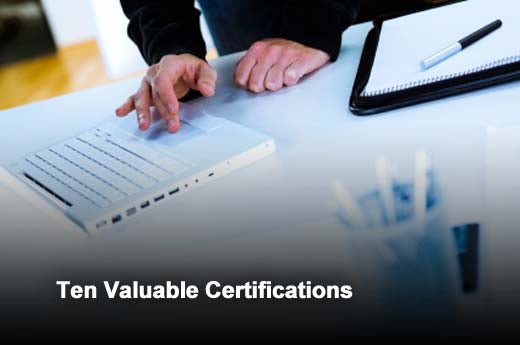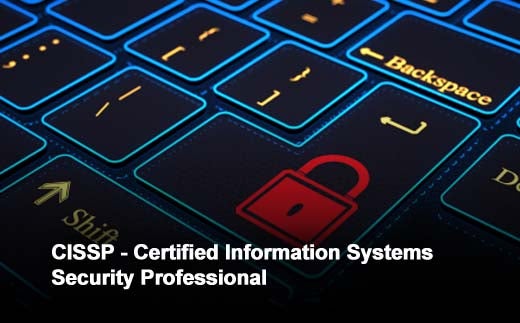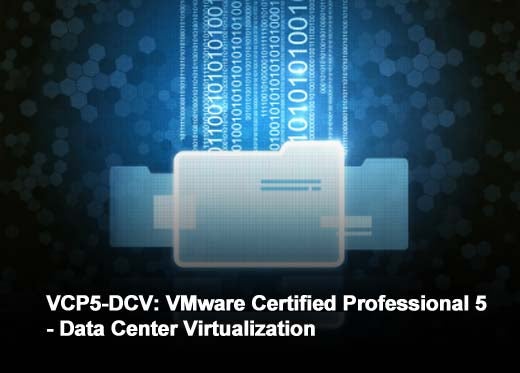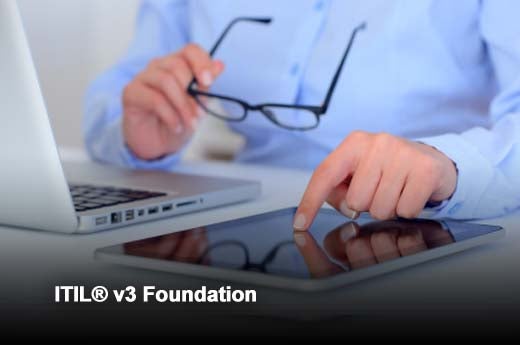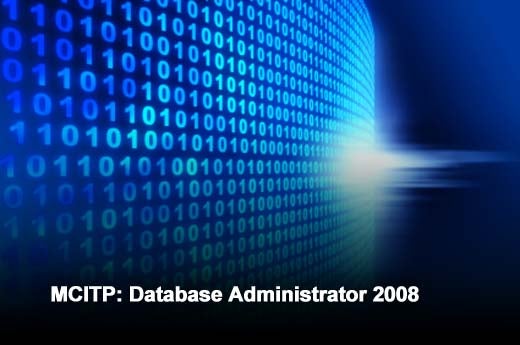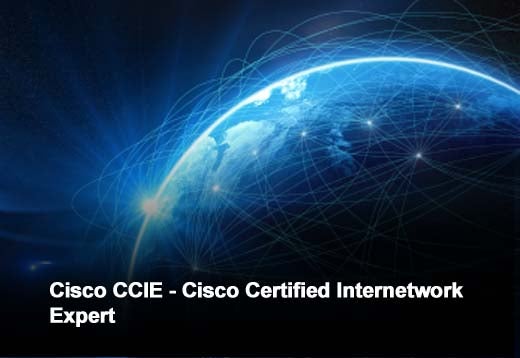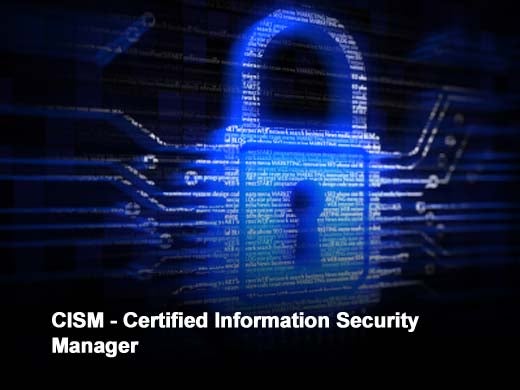What gives meaning to a certification? Is it the certification vendor? Is it the subject? Or is it the perceived difficulty, mystique or aura? Or might it be something totally different? There are some certifications and/or vendors that are perceived to be more valuable – think of Cisco’s CCIE, which has been perceived as meaning something (value) since its inception. Then there are other certifications that don’t have this same perceived value – certifications that are seen as too easy or ones that might be seen as entry-level certifications. Global Knowledge instructor Randy Muller, MCT, MCTS, MCSE, CEH, has identified a list of certifications that do have perceived value and worth.
Click through for 10 certifications that have perceived value and worth, as identified by Global Knowledge instructor Randy Muller, MCT, MCTS, MCSE, CEH.
The Project Management Professional (PMP) certification from the Project Management Institute’s (PMI) credential is universally recognized as the most important certification for project managers. Those with a PMP are in great demand and highly sought after by corporations. The Project Management Professional credential demonstrates that you have documented project management experience as well as professional education to successfully lead and direct projects. The PMP credential is for experienced project management professionals as the qualifications and testing for this certification are rigorous, and there are required continuing education requirements. All of these factors ensure that the PMP credential is widely respected. The PMP experience and exam requirements focus on five process groups: Initiating, Planning, Executing, Controlling, and Closing.
Security managers and security professionals who develop policies and procedures in information security will benefit from the Certified Information Systems Security Professional (CISSP). The CISSP certification is the gold standard in information security certifications and education. Earning and maintaining a CISSP certification is required for many governmental, military, and civilian security positions. The CISSP was the first credential in the field of information security, accredited by the ANSI (American National Standards Institute) to ISO (International Organization for Standardization) Standard 17024:2003.
The demand for skilled and certified virtualization professionals is growing quickly, especially those professionals with data center virtualization skills. In the highly competitive virtualization market, it is essential to distinguish yourself with a certification that validates your technical capabilities. VMware is one of the leading vendors of virtualization products and earning a VMware certification is the first step toward gaining industry-recognized expertise in virtual infrastructure. There are three certification levels with VMware: VMware Certified Professional (VCP), VMware Certified Advanced Professional (VCAP), and the VMware Certified Design Expert (VCDX). To earn your VCP, you must attend a class (not always required from other vendors) and then pass the certification test. The VCP5-DCV (VMware Certified Professional 5 – Data Center Virtualization) is the latest certification on vSphere and highly sought after.
The Information Technology Infrastructure Library (ITILv3) is a foundational process that provides for quality IT service management. The success of ITIL is through the use of documented and proven processes that cover the entire service lifecycle. The ITIL Expert level is the third of four levels. The ITIL Expert level certification is aimed at those individuals who are interested in demonstrating a superior level of knowledge of ITIL Version 3 (V3) in its entirety. Once you have achieved ITIL Expert level, you will also satisfy the pre-requisite entry criteria for the ITIL Master level, the highest level of certification within the ITIL V3 scheme, though the Master level is still under development.
The MCITP certification validates that the IT professional is capable of deploying, building, designing, optimizing, and operating technologies for a particular job role. MCITP certifications build on the technical proficiency measured in the Microsoft Certified Technology Specialist (MCTS) certifications. The MCITP Database Administrator demonstrates knowledge of SQL Server instances and database solutions, database server security solutions, high-availability databases, backup and recovery solutions, monitoring strategies, database management and maintenance strategies, and data distribution strategies. The exams for this certification will retire in late July 2013 – replaced by the MCSE: Data Platform. The MCSE: Data Platform demonstrates that you have a broad skill set in building and administering enterprise-scale data solutions on both cloud environments and on-premises.
When one thinks of a highly sought after certification, generally, the first one most people think of is the CCIE. The Cisco Certified Internetwork Expert is the highest level of certification offered by Cisco and is one of the most respected. You must prove your knowledge through arduous hands-on lab – no memorization, pure hands-on examination – and this is regarded as one of the most difficult and sought after IT certifications today. There are nine discrete CCIE specializations to the CCIE Program and, as of January 2012, there were a little over 25,000 CCIE professional around the world. The CCIE exam focuses on managing large, converged networks.
The Red Hat certification program is seen as one of the most prominent Linux certification programs, if not the most prominent. What distinguishes the Red Hat certification program is that it is performance-based – i.e., candidates must perform specified tasks on a live system and not just take a computer-based, multiple-choice test. Within the Red Hat certification program, the Red Hat Certified Architect is considered the most complete (and grueling) certification amongst the seven major Red Hat certifications (some equate the prestige of the RHCA as equal to that of the Microsoft Certified Master and possibly the CCIE). The program provides an enterprise-level focus on the Red Hat technology solutions. Red Hat systems provide unique, cost-effective infrastructure management systems such as cloud systems and server technology to enterprises.
A recent change to Microsoft’s Certification program also engendered a name change for the Microsoft Certified Master (MCM) to Microsoft Certified Solutions Master (MCSM – similar to the changes with MCSA and MCSE). The Microsoft Certified Solutions Master (MCSM) certifications validate skills that are deeper and broader than those validated by MCM certifications, skills that are required to build solutions both on-premises and in the cloud. Currently, there are five MCSM fields – each of which requires an examination and an exhaustive hands-on lab. The MCSM is a prerequisite for the Microsoft Certified Architect – the premier Microsoft certification.
This certification is offered by ISACA (formerly known as the Information Systems Audit and Control Association) and is only given three times a year (new for 2013 – before it was just twice a year). The CISM is aimed at higher-level IT security positions – those who are involved in the design, management, and building of enterprise information security programs. This certification requires that you have a number of years of documentable experience along with education requirements.
The Global Information Assurance Certification, or GIAC, is considered one of the most prestigious certifications in the IT field, and the GIAC Security Expert (GSE) certification is considered to be one of the hardest security certifications to obtain. This is a two-part exam with a computer-based exam and a two-day, hands-on lab that tests the depth and breadth of your security knowledge. Traditionally, the CISSP certification (Certified Information Systems Security Professional) has been considered to be the premier security certification. Now the GSE looks as though it might overtake this venerable certification.


